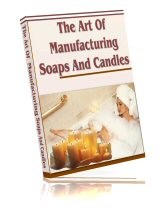 License Type: Resell Rights
License Type: Resell Rights  File Size: 1,290 KB
File Size: 1,290 KB File Type: ZIP
File Type: ZIP
 SKU: 16608
SKU: 16608  Shipping: Online Download
Shipping: Online Download
Ebook Sample Content Preview:
We distinguish soft soaps (potash soaps) from hard soaps (soda soaps), and filled soaps from grain soaps. In regard to the organic ingredients, we lay arrange them in two groups, rosin soaps and fat or oil soaps.
Among the latter, we may mention as the more important, tallow soaps, palm oil, coconut oil, and olive oil soaps. In addition to these, however, there are many mixtures of fatty substances in combination with alkalis, known as soaps.
In good soap there is a definite proportion between the water, the alkaline base, and the fatty acids. It must be neutral, i.e., there should be no excess either of the base, or of the constituents of the fat, and at the same time it must be free from salt, or an excess of water, which is virtually as much of an adulteration as an admixture of salt, soda, alum, bone ashes, glauber salt, or other substances.
A good soap is easily soluble in alcohol, leaving scarcely 1 percent of solid residue, and forms a gelatinous liquid in boiling water. I once received a whitish-gray marbled soap for analysis, which showed the following properties: It was much softer than an ordinary curd soap, so that it could be cut like butter, and drops of water issued from each cutting. When I left it in a dry place, it did not only effiloresce a good deal of soda, but also crystals of soda were formed in the interior, so that the soap cracked throughout. Heated on the water-bath, it soon became liquid, and left upon evaporation 22 percent of a solid residue, consisting of coconut oil soap and carbonate of soda.
It may here be mentioned, that a hard or marbled soap should not contain more than 25 percent of water, rosin soap not more than 40, and a soft soap not more than 52. For coconut oil soaps, however, a larger amount of water than 52 percent may be allowed. In the yellow soap, a part of the fat is justifiably replaced by 10 to 25 percent of rosin.
The proportions here named may be regarded as a standard, and whenever they are increased or replaced by a substitute, it may be said that they generally diminish the good quality of the soap.
The introduction of a foreign substance may, in a few cases, be justifiable. Some believe that an excess of alkali is necessary, in order that the soap may be used in spring water without loss.
It may be mentioned, that in this case, the salts of lime and magnesia contained in the water, form insoluble compounds with the fatty acids of the soap, and these are of no cleansing effect. But whenever spring water is used for washing, a small admixture of carbonate of soda is more advantageous than the appliance of a soap containing free alkalis.








